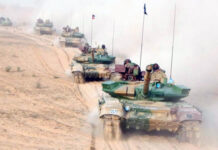MIDHANI Develops Pure Nickel Wire For Ventilators
Mishra Mishra Dhatu Nigam Limited (MIDHANI) has developed 99.6 percent pure Nickel wire of dia 158 microns for ventilators use in a records time of 96 hours, the company announced on 4 May.
The wire will be used in oxygen sensors pertaining to critical care ventilator. Prior to this development, the Nickel wire of these purity standards used to be imported. Supposedly, this innovative move of the Defence PSU will strengthen India’s fight against Coronavirus (Covid-19).
The news came almost a month after Bharat Electronics Limited (BEL) announced the production of ventilators with the help of local companies.
MIDHANI is specialized metals and metal alloys manufacturing facility in India, located in Hyderabad, Telangana. It is a public sector undertaking (PSU), under the administrative control of Department of Defence Production, Ministry of Defence.
New Remote Weapon Station by OFB
India’s Ordnance Factory Board (OFB) has developed a new remotely operated weapon station (ROWS) armed with the Russian-designed NSVT 12.7 mm heavy machine gun (HMG), in conjunction with Bharat Electronics Limited (BEL), according to the Ordnance Factory Board’s (OFB) portfolio.
The new ROWS, which is simply designated Remote Control Weapon Station (RCWS), broke its cover at the DefExpo 2020 defense show held in Lucknow in early February. The unmanned combat station was specifically designed to carry a combat-ready NSVT HMG, which is mounted on a two-axis stabilizer.
The RCWS can be used to engage both ground and aerial targets, with keeping its operator safe from threats. Originally, the station was intended for the upgraded Arjun Mk. IA main battle tank (MBT). The module has also been configured for the Arjun armored recovery vehicle and the C-431 patrol ship of the Indian Coast Guard; however, it can be installed on a wide range of ground and surface carriers. The RCWS works in both day and night modes and is equipped with a laser rangefinder. An automatic target tracker and a remote arming device can be additionally mounted.
According to the OFB, the organic armament suite of the new unmanned station can be reinforced with an anti-tank missile, machine gun, or automatic grenade launcher. “The module can be employed during low-intensity conflicts,” says the portfolio, adding that the RCWS had already passed through firing tests at sea.
India is also reported to have imported marinized unmanned combat stations from Israel: since 2016, the Asian country has been negotiating the acquisition of 747 Elbit Systems’ RCWSs armed with 12.7 mm HMGs (probably M2HBs, but Elbit also offers its combat stations with the NSVT machine gun). India was planning to directly import 136 RCWSs and produce the remaining 611 modules in-house.
The OFB did not provide any detailed information about the new combat station. However, it is believed to carry a traditional sensor suite with a daylight TV camera, thermal imager and laser rangefinder.
HAL working on Cheaper TejEx LCA For Export
After successfully reducing the price of the upgraded Tejas Mk1A by nearly half at less than $45 million a unit for soon to be concluded order for 83 jets, Hindustan Aeronautics Limited (HAL) is working on developing a low-cost version of the fighter jet designated as “TejEx” for Export Market from 2023 onwards.
TejEx will be more expensive than the Tejas Mk1A but will be cheaper then Mk1 which HAL has currently in production. TejEx can be customizable as per customer requirements and can have systems and subsystems from both Mk1 and Mk1A configuration to make it slot right between both the aircraft in terms of technology on offer.
TejEx test plane will be HAL funded and will be used as a product demonstrator for the potential customers and the first aircraft will likely be ready by end of 2023 once the system and configuration are confirmed after considering the requirements of the export market.
TejEx will have the radar option of ELA-2032/MMR, ELA-2052 and even Uttam AESA in later stages with choice of weapons integration which includes India’s offering like Astra BVRAAM, SAAW and Inertial guided bomb. Weapons that have been cleared for Tejas Mk1 and Mk1A will also be on offer.
Procurement Rules Relaxed For Armed Forces
The Ministry of Defence (MoD) has invoked emergency powers in the wake of the coronavirus outbreak to expedite the procurement of supplies required to establish and run quarantine and isolation facilities for the Indian Armed Forces and as well other facilities requested by the civil administration across the country.
The emergency powers will provide three important exemptions in the existing procurement rules – exemption from long-drawn bidding procedure, dispensation of procurement from Government e-Marketplace (GeM) and making 100 percent advance payment to suppliers after due diligence – to procure necessary supply in the fastest possible manner.
The move will ensure swift and smooth purchase of stores, equipment, rations, chemicals, medicines and also their speedy transportation by the armed forces.
Since the armed forces have been asked to set up facilities for troops and also extending help to local authorities through quarantine facilities in Rajasthan, Telangana, Uttar Pradesh, Andhra Pradesh, Bihar, Maharashtra, Kerala, Tamil Nadu, Karnataka and Assam, the prevailing health emergency requires immediate procurement of certain items in quantities, which may not be available with a single supplier or within the time-frame in which they are needed.
As per the directive, army units too have been exempted from government financial rules which makes it mandatory for them to purchase provisions through GeM.
The ministry said that the rules related to GeM purchase will not be applicable to emergent purchases, medical and other supplies related to Covid-19 operations.
The army formations have also been exempted from lengthy bidding procedure by relaxing the existing rules. The normal bidding procedure for procurement is a long-drawn process but in this pandemic situation, the MoD has allowed to receive bids by email or fax instead of e-procurement portals. The army formations will verify the authenticity of the firms and bidding time will be reduced as per the emergent requirement.
Bharat Dynamics Wins IAF Missile Order
Bharat Dynamics Limited (BDL) said, on 5 May, that it had bagged a Rs. 293.33 crore ($40 million) order for supplying Medium Range Surface-to-Air Missile (MRSAM) sections for the Indian Air Force (IAF) deliverables.
The order will be executed by the company within the next 24 months. The company had (provisional and audited) an order book of Rs 7,413 crore ($977 million) till 1 April, including Akash missiles (seven squadron) contract for Rs 1,700 crore ($225 million) received during the quarter ended 31 March.
Soon after the stock exchange filing on the new order for MRSAM sections, Bharat Dynamics jumped five per cent to Rs. 224.85 ($2.95). The stock has gained 7.38 per cent in two trading sessions from its previous closing low of Rs 209.4 ($2.76) posted on May 4.
BDL’s standalone net profit fell 71.8 per cent to Rs 53.18 crore ($7 million) on a 49.6 per cent decline in net sales to Rs 495.42 crore ($65 million) in third quarters ending December 2019 over the corresponding quarters in December 2018.
Bharat Dynamics designs and manufactures guided weapon systems and its products include Milan-2T, Konkurs-M, Invar ATGM, Akash, advanced lightweight torpedo (TAL), torpedo counter measure system, counter measures dispensing system and infrared interference indicator.
Indian Navy Partners With Think3D
The Indian Navy has partnered with Indian 3D printing service bureau think3D to help produce spare parts on demand using additive manufacturing, for both on and off-shore scenarios.
The availability of spare parts has been a recurring problem for the Indian Navy due to the use of old, imported machinery. Collaborating with think3D, the Indian Navy has sought to solve this problem by instead 3D printing spare parts and replacing them on demand. think3D has supplied various 3D printed spare parts to Indian Navy, all of which have been successfully tested and incorporated into its machinery. One particular case study that the company has shared revolves around the replacement of centrifugal pump impellers, key components for a ship’s operation, using 3D printing.
Seeking an alternative manufacturing process where these impellers can be produced quickly and at a lower cost of ownership, the Indian Navy identified 3D printing as a possible solution, and contacted think3D.
After being contacted by the Indian Navy, the think3D team visited the ships to understand the problem in detail and to collect data on the impellers, including material properties required and boundary conditions. Its first step involved 3D scanning the impeller and reverse engineering its design. This was performed using an EinScan Pro+ 3D Scanner and CREO to create the CAD model based on the scanned data. Using ANSYS software, think3D then investigated which material and 3D printing process would benefit the application. Various materials like nylon composites, glass filled nylon, PA12, other regular plastics were tested for suitability.
With the successful completion of the 3D Printed impeller, think3D has now set its sights on building a digital repository of impellers for the Indian Navy. Once the repository is built, the company has committed to 3D printing the required impellers on demand to supply to the Navy.
Recently, the maritime industry has increased its adoption of 3D printing technology to combat similar issues experienced by the Indian Navy, mainly surrounding the supply of spare parts.
Israeli Defence Companies Adapt Sensors to Screen For Virus
Israel’s Ministry of Defense (MoD) was working with two Israeli defence companies to develop radar- and electro-optical-based sensors to monitor peoples’ vital signs and identify ones infected with Covid-19. The programme is led by the National Emergency Team of the Directorate of Defense Research and Development (DDR&D) under the MoD.
The ministry made the announcement on 31 March, saying Elbit and Israel Aerospace Industries (IAI) have adapted existing systems. “The data, including pulse, respiratory rate and temperature, are measured remotely using a combination of radar and electro-optical sensors, thus reducing the risk of infection to medical personnel. The next stage of development [is] screening and prioritising patient care based on the analysis of vital data.”
IAI-Elta took its 1 kg ELM-2114 perimeter surveillance radar as the basis for its medical system. The radar uses the very low frequency K-band so can be safely placed very close to people. Using the radar, the system can track a person’s movements as they breath as well as their pulse when placed 3 metres away, with medics in another room receiving readings in seconds.
IAI is currently producing its first system and expects to start producing several more for hospitals within two weeks.
BEL, HAL, BEML Get Back to Business
Defence production, which had come to a standstill for close to a month in the wake of the government enforcing a lockdown to combat the spread of the Covid-19, resumed on 28 April. More than 36,000 employees work with the three PSUs.
Hindustan Aeronautics Limited (HAL), Bharat Electronics Limited (BEL) and Bharat Earth Movers Limited (BEML) – all headquartered in Bengaluru – had ordered the closing down of their manufacturing units from March 24 onwards.
HAL is the only aircraft manufacturer in the country. It produces the LCA, Su-30 MkI, Hawk, Dornier aircraft, Chetak, Cheetah, ALH Dhruv helicopters besides producing engines, avionics, aerospace systems and materials.
BEL makes products in the areas of radars, missile systems, military communications, naval systems, electronic warfare and avionics, among others.
BEML, which is involved in the manufacturing of trucks used by the military and also integral rail coaches and metro cars, has about 7,000 employees all over India with about 2,000 working in Bengaluru alone.
Thales Reliance Defence Systems Resumes Operations
Thales Reliance Defence Systems (TRDS) resumed operations in MIHAN special economic zone (SEZ) in Nagpur in Maharashtra after the Centre eased restrictions for some sectors amid the lockdown for the coronavirus outbreak. In a release, on 21 April, the firm said it was providing a safe working environment and said it was operating at 30 per cent staff in the first phase now.
TRDS has finished assembly and testing of first AESA radar at its facility in MIHAN. It will also be undertaking the assembly of electronic warfare systems here, the only facility outside France to have this capability, the release said.
Dassault Reliance Aerospace Resumes Operations
Dassault Reliance Aerospace Ltd (DRAL) re-started operations, on 20 April, at its Mihan special economic zone (SEZ) in Nagpur, in line with the government’s plan to lift the nationwide lockdown in a phased manner, according to a company statement. The company will operate with 25-30% of its total strength in the first phase, and plans to scale up operations as per the directives of the district administration and local authorities.
Dassault Reliance Aerospace supplies aero structure assemblies for Falcon 2000 business jets and components for Rafale aircraft, as part of the global supply chain for Dassault Aviation.
Anil Ambani-led Reliance Infrastructure Ltd holds 51% stake in DRAL, a joint venture with Rafale fighter jet manufacturer Dassault Aviation which owns the remaining.
The government had initially imposed a 21-day national lockdown, effective 25 March and till 14 April. With the rise in the number of Covid-19 cases in the country, it decided to extend the lockdown until 3 May but allowed some sectors to resume operations.
Captions
Bharat Electronics Ltd unveiled a Remote Controlled Weapon Station armed with a 12.7mm machine gun at Aero India in 2017. Seen here are the CMD of BEL, MW Gawtama and Maj Gen GD Bakshi, Editor IMR.
BDL has bagged a Rs 293 crore order from the IAF for MRSAM sections



















